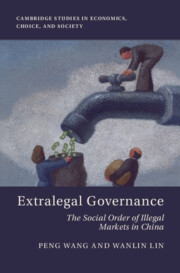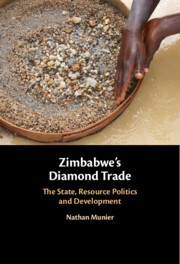Refine search
Actions for selected content:
599 results
Chapter 2 - Commoning the Fens
- from Part I - Scales of Action
-
- Book:
- Violent Waters
- Published online:
- 17 December 2025
- Print publication:
- 08 January 2026, pp 33-64
-
- Chapter
- Export citation
Introduction
-
- Book:
- Empires of Labor
- Published online:
- 30 November 2025
- Print publication:
- 18 December 2025, pp 1-34
-
- Chapter
- Export citation

Artificial Intelligence and Public Policy
-
- Published online:
- 15 December 2025
- Print publication:
- 22 January 2026
-
- Element
-
- You have access
- HTML
- Export citation
Parliamentary Oversight and the Effects of Controlled Institutional Settings on Behavioural Logics
-
- Journal:
- Government and Opposition , First View
- Published online by Cambridge University Press:
- 09 December 2025, pp. 1-22
-
- Article
-
- You have access
- Open access
- HTML
- Export citation
1 - The Diamond Curse in Zimbabwe
-
- Book:
- Zimbabwe's Diamond Trade
- Published online:
- 06 November 2025
- Print publication:
- 04 December 2025, pp 1-22
-
- Chapter
- Export citation
7 - Resource Wealth and the Opaque State
-
- Book:
- Zimbabwe's Diamond Trade
- Published online:
- 06 November 2025
- Print publication:
- 04 December 2025, pp 141-157
-
- Chapter
- Export citation
“Opulence and Freedom”: What Adam Smith Could Teach Us about the Future of Capitalism
-
- Journal:
- Social Philosophy and Policy / Volume 42 / Issue 2 / Winter 2025
- Published online by Cambridge University Press:
- 16 December 2025, pp. 516-545
- Print publication:
- Winter 2025
-
- Article
-
- You have access
- Open access
- HTML
- Export citation

Extralegal Governance
- The Social Order of Illegal Markets in China
-
- Published online:
- 21 November 2025
- Print publication:
- 25 September 2025
The Future of United Nations Peacekeeping in a Fragmenting World
-
- Journal:
- International Organization / Volume 79 / Issue S1 / December 2025
- Published online by Cambridge University Press:
- 20 November 2025, pp. S148-S161
- Print publication:
- December 2025
-
- Article
-
- You have access
- Open access
- HTML
- Export citation
Chapter 19 - The Materialisms of African Literature
- from Part III - Contemporary Reconfigurations or Shifting Globalities and Positionalities
-
-
- Book:
- African Literature in Transition
- Published online:
- 07 November 2025
- Print publication:
- 20 November 2025, pp 339-352
-
- Chapter
- Export citation
Banking on research: Who leads? Who follows? Who cares?
-
- Journal:
- Journal of Institutional Economics / Volume 21 / 2025
- Published online by Cambridge University Press:
- 10 November 2025, e42
-
- Article
-
- You have access
- Open access
- HTML
- Export citation

Zimbabwe's Diamond Trade
- The State, Resource Politics and Development
-
- Published online:
- 06 November 2025
- Print publication:
- 04 December 2025
1 - Introduction
-
- Book:
- Institutional Change and Property Rights before the Industrial Revolution
- Published online:
- 23 October 2025
- Print publication:
- 06 November 2025, pp 1-22
-
- Chapter
- Export citation
7 - Tracing Liberal Democracy’s Influence on Educational Policy
- from Part III - Testing Underlying Assumptions
-
- Book:
- Faith in Democracy
- Published online:
- 23 October 2025
- Print publication:
- 06 November 2025, pp 157-198
-
- Chapter
- Export citation
7 - The Economic Consequences of Wardship
-
- Book:
- Institutional Change and Property Rights before the Industrial Revolution
- Published online:
- 23 October 2025
- Print publication:
- 06 November 2025, pp 166-183
-
- Chapter
- Export citation
3 - Transaction Costs and Institutions
-
- Book:
- Politics as Exchange
- Published online:
- 23 October 2025
- Print publication:
- 06 November 2025, pp 33-49
-
- Chapter
- Export citation
Conclusion
-
- Book:
- Institutional Change and Property Rights before the Industrial Revolution
- Published online:
- 23 October 2025
- Print publication:
- 06 November 2025, pp 229-234
-
- Chapter
- Export citation
6 - The Institutional Structure of the Political Marketplace
-
- Book:
- Politics as Exchange
- Published online:
- 23 October 2025
- Print publication:
- 06 November 2025, pp 87-104
-
- Chapter
- Export citation
General Conclusion
-
- Book:
- Court, Credit, and Capital
- Published online:
- 24 November 2025
- Print publication:
- 16 October 2025, pp 251-265
-
- Chapter
- Export citation
Navigating Contentious Identities: Minority Women in Israeli Politics
-
- Journal:
- Journal of Race, Ethnicity and Politics , First View
- Published online by Cambridge University Press:
- 09 October 2025, pp. 1-38
-
- Article
-
- You have access
- Open access
- HTML
- Export citation
